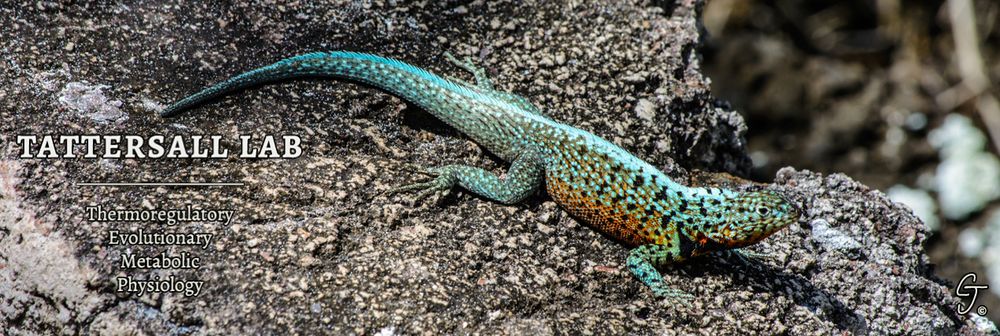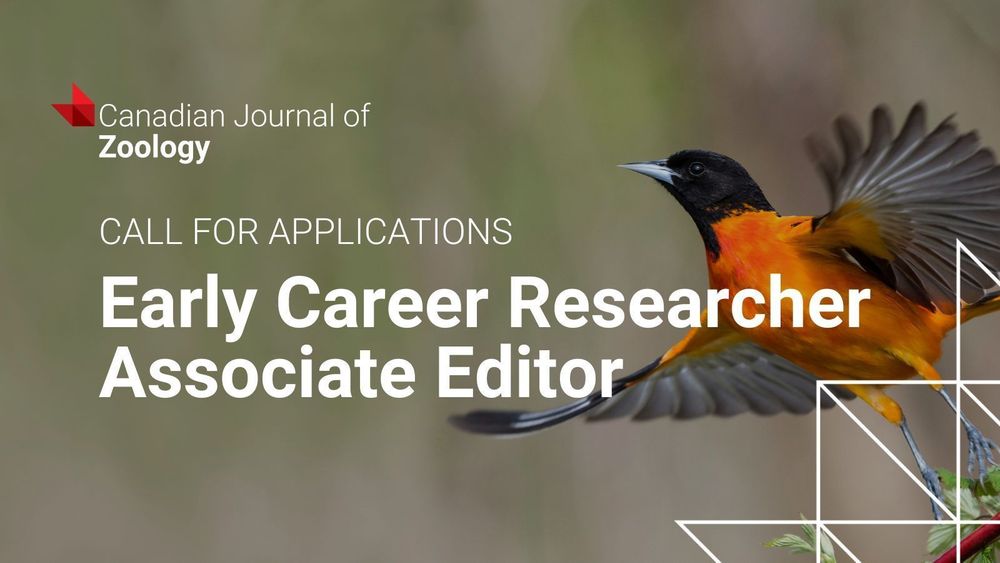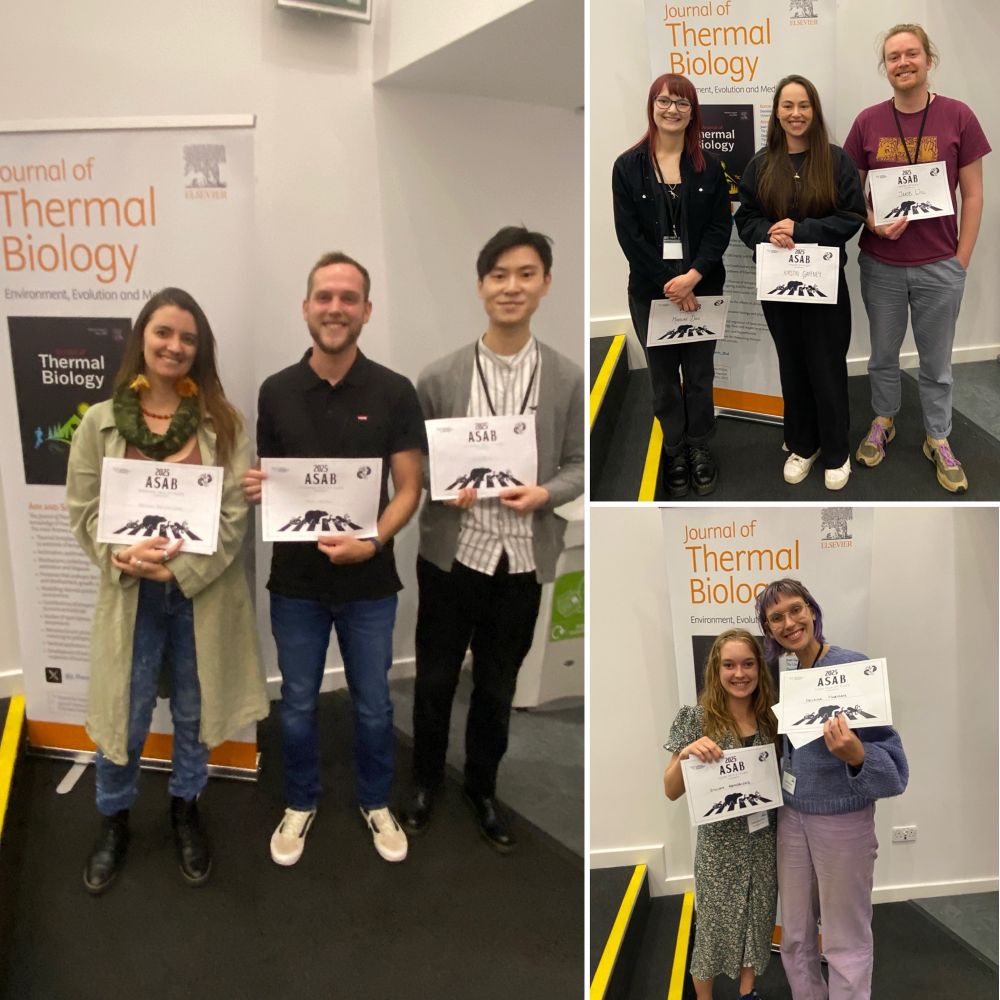
Professor, Biological Sciences
Associate Editor, Journal of Thermal Biology
TattersallLab.com
Been working in thermal biology before it was such a hot topic, back when it was cool...
We show that even short-term, gentle handling changes skin temperature and activity in salamanders, with implications for thermal physiology research and animal welfare. 🌡️🔥
doi.org/10.1016/j.jt...
@tattersallg.bsky.social @melaniedscientist.bsky.social @thermal-biology.bsky.social
We show that even short-term, gentle handling changes skin temperature and activity in salamanders, with implications for thermal physiology research and animal welfare. 🌡️🔥
doi.org/10.1016/j.jt...
@tattersallg.bsky.social @melaniedscientist.bsky.social @thermal-biology.bsky.social
Measuring body temperature should seem straightforward, but in ectotherms, the act of measuring can be part of the problem. For especially small amphibians in particular, common approaches like cloacal thermometry require…

Measuring body temperature should seem straightforward, but in ectotherms, the act of measuring can be part of the problem. For especially small amphibians in particular, common approaches like cloacal thermometry require…
A lot of news has happened in the past month and I have been negligent about updating. All lab members have had awards, scholarships, and bursary announcements that warrant celebration! • Melane Denommé Stauder (PhD student) will be receiving the Jack Miller Graduate Award…
A lot of news has happened in the past month and I have been negligent about updating. All lab members have had awards, scholarships, and bursary announcements that warrant celebration! • Melane Denommé Stauder (PhD student) will be receiving the Jack Miller Graduate Award…
Operative temperatures of Eastern Garter Snakes (Thamnophis sirtalis sirtalis) reveal a Goldilocks effect for habitat use
harrykumbhani.bsky.social et al., including Dr. Glenn Tattersall and
Dr. Danilo Giacometti (he/him) 🇧🇷🇨🇦
https://ow.ly/vhwz50XWN0C
#FreeAccess while featured!
Operative temperatures of Eastern Garter Snakes (Thamnophis sirtalis sirtalis) reveal a Goldilocks effect for habitat use
harrykumbhani.bsky.social et al., including Dr. Glenn Tattersall and
Dr. Danilo Giacometti (he/him) 🇧🇷🇨🇦
https://ow.ly/vhwz50XWN0C
#FreeAccess while featured!
publications in this limited series ❄️

publications in this limited series ❄️

Danilo Giacometti was interviewed by NPR a couple of weeks ago about our blue-spotted salamander paper in CJZ. Check it out here: And next spring, see if you can find salamanders migrating over snow.

Danilo Giacometti was interviewed by NPR a couple of weeks ago about our blue-spotted salamander paper in CJZ. Check it out here: And next spring, see if you can find salamanders migrating over snow.
A recent paper from the lab, led by PhD student Melanie Denommé, examines a foundational assumption in reptile husbandry: that animals will inherently prefer naturalistic enclosures over simpler, more utilitarian ones. Using…

A recent paper from the lab, led by PhD student Melanie Denommé, examines a foundational assumption in reptile husbandry: that animals will inherently prefer naturalistic enclosures over simpler, more utilitarian ones. Using…
Our new paper, led by MSc student Harry Kumbhani and building on fieldwork conducted by former MSc student Curtis Abney, explores how Eastern Garter Snakes (Figure 1) navigate the complex thermal landscapes of…
Our new paper, led by MSc student Harry Kumbhani and building on fieldwork conducted by former MSc student Curtis Abney, explores how Eastern Garter Snakes (Figure 1) navigate the complex thermal landscapes of…
A new study led by Morgane Vandendoren, Nicole Bedford, and others from Adam Nelson's lab at the University of Wyoming has uncovered a new role for oxytocin, the so-called “love hormone.” Published in eLife, the research shows that oxytocin…
A new study led by Morgane Vandendoren, Nicole Bedford, and others from Adam Nelson's lab at the University of Wyoming has uncovered a new role for oxytocin, the so-called “love hormone.” Published in eLife, the research shows that oxytocin…

We demonstrate that sexually selected traits like horns and claws aren’t just about mating success: these structures can also shape thermal biology. 🦀🪲🌡️
doi.org/10.1093/icb/...
@tattersallg.bsky.social @avpalaoro.bsky.social @sicbjournals.bsky.social

We demonstrate that sexually selected traits like horns and claws aren’t just about mating success: these structures can also shape thermal biology. 🦀🪲🌡️
doi.org/10.1093/icb/...
@tattersallg.bsky.social @avpalaoro.bsky.social @sicbjournals.bsky.social
In the cold, temperate forests, long before spring fully arrives, blue-spotted salamanders (Ambystoma laterale) are already on the move. These small amphibians begin migrating to their breeding ponds while snow still blankets the ground and…

In the cold, temperate forests, long before spring fully arrives, blue-spotted salamanders (Ambystoma laterale) are already on the move. These small amphibians begin migrating to their breeding ponds while snow still blankets the ground and…
With a fellowship given by the São Paulo Research Foundation, I'll study the mechanisms underlying behavioural fever in amphibians and reptiles 🐸🦎🌡️
▶️ buff.ly/hpVApYd
#AcademicSky #SciComm 🧪 #AcWri #PHDSky #ScholComms

▶️ buff.ly/hpVApYd
#AcademicSky #SciComm 🧪 #AcWri #PHDSky #ScholComms
Talks: Justin Tsz Hin Lo, Francesca Angiolani-Larrea and Gabriel Melhado
Posters: @madelinedavis.bsky.social,
Kirstin Gaffney and Jakob Wiil
Flash talks: Jillian Hendricks and Helana Norman
Prizes generously donated by @jthermbiol.bsky.social 🥰

Talks: Justin Tsz Hin Lo, Francesca Angiolani-Larrea and Gabriel Melhado
Posters: @madelinedavis.bsky.social,
Kirstin Gaffney and Jakob Wiil
Flash talks: Jillian Hendricks and Helana Norman
Prizes generously donated by @jthermbiol.bsky.social 🥰


www.sciencedirect.com/science/arti...

www.sciencedirect.com/science/arti...
www.science.org/doi/full/10....
www.science.org/doi/full/10....
We’re excited to share the publication of a new paper in Ecography, led by PhD candidate Sara Ryding (Deakin University, collaboration with Matt Symonds Lab), which explores how climate change may be reshaping the…

We’re excited to share the publication of a new paper in Ecography, led by PhD candidate Sara Ryding (Deakin University, collaboration with Matt Symonds Lab), which explores how climate change may be reshaping the…
journals.biologists.com/jeb/article/...

journals.biologists.com/jeb/article/...

